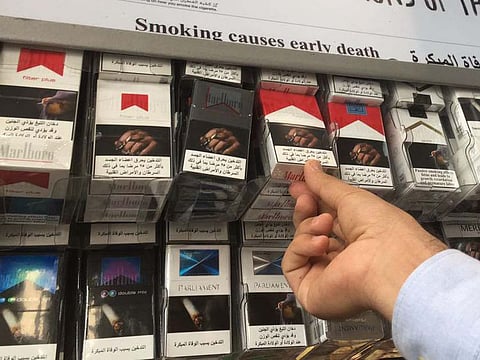Each cigarette to cost 40 fils more from December 1
10fils excise tax will also be levied on every gram of ready-to-use tobacco

Dubai: The Ministry of Finance on Tuesday announced a minimum excise tax of Dh0.40 (US $0.11) will be applied per individual cigarette from December 1,
Also, a minimum excise tax of Dh0.10 (US $0.027) will be levied upon every gram of water pipe tobacco, ready-to-use tobacco or similar products.
The Federal Tax Authority (FTA) announced it would start implementing the excise tax on electronic smoking devices and tools and sweetened beverages as well by December 1. The FTA called upon importers, producers and stockpilers of electronic smoking devices, liquids used in such devices and sweetened drinks to register for the excise tax system as soon as possible.
The authority stressed that registering for the tax will avoid all stakeholders any fines or obstacles that may arise from late or failed registration.
Earlier, the UAE introduced the excise tax from as of October 2017 on goods, which are deemed harmful to public health or to the environment in order to reduce consumption and increase government revenues allocated to cover the costs of public services.
According to the previously enacted law, the excise tax rate ranged from 50 to 100 per cent on tobacco and its products, energy drinks and soft drinks.
Liquids used in e-cigarette includes all liquids used in electronic smoking devices and tools and the like, whether or not they contain nicotine, according to the customs codes to be specified by a ministerial decree.
Sin taxes levied worldwide by governments usually have a positive impact on the population and are seen as an effective tool in regulating the intake of products that are deemed unhealthy for the population.
Decisive step
Commenting on the move, Dr Sreedhar Sreekumar, internal medicine specialist at Aster Clinic Karama, an active anti-smoking crusader, lauded the new tax that will come into effect by the end of the year. “This might be a small step but it is a decisive and positive step towards encouraging smokers to quit the deadly habit. If there is a tax of 0.40 fils per cigarette, for a box of 20, it will mean an increase of Dh8 per box. If an individual is addicted it will mean a substantial financial hole in his pocket. This will definitely prompt some to at least cut down on the number of cigarettes they smoke per day. Many will think of quitting. Of course, with taxes like these, there will obviously be a stubborn few for whom it will make no difference and they will continue to indulge themselves. Overall, any move like this is guaranteed to bring down the incidence of smoking.”
Reducing consumption of cigarettes and tobacco products is one of the key performance indicators as per the UAE National Agenda 2. The UAE aims to reduce tobacco consumption from 21.6 per cent to 15.7 per cent among men and from 1.9 per cent to 1.66 per cent among women by the year 2021.
According to research, male and female smokers having one-four cigarettes per day have a significantly higher risk of dying from ischaemic heart disease and lung cancer. But those who cut down on smoking usually end up quitting smoking altogether. This not only stands to benefit the individual who kicks the habit but also those around him who turn unwittingly into passive smokers. Currently, over 14.5 per cent of men and 1.3 per cent of females of the total UAE population are smokers.
In October 2017, the UAE introduced excise tax on goods, which are deemed harmful to public health or to the environment in order to reduce consumption and increase government revenues allocated to cover the costs of public services.



